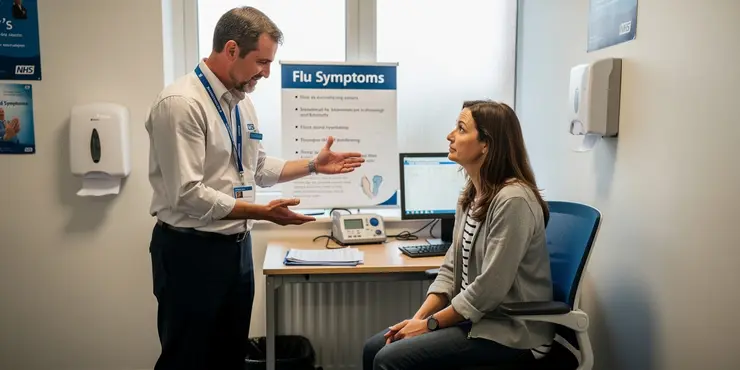Find Help
More Items From Ergsy search
-

Symptoms of flu (influenza)
Relevance: 100%
-

Treating flu (influenza)
Relevance: 79%
-

What are the symptoms of Super Flu?
Relevance: 63%
-

What are the symptoms of H3N2 flu?
Relevance: 63%
-

Can the flu jab give you the flu?
Relevance: 58%
-

What are the symptoms of flu ?
Relevance: 58%
-

How is Super Flu diagnosed?
Relevance: 57%
-

Can the flu vaccine give you the flu?
Relevance: 55%
-

Can Super Flu cause a pandemic?
Relevance: 53%
-

Can animals get Super Flu?
Relevance: 53%
-

Is the Super Flu contagious?
Relevance: 53%
-

How effective is the flu vaccine?
Relevance: 52%
-

What is the H3N2 flu strain?
Relevance: 52%
-

What is Super Flu?
Relevance: 52%
-

Has Super Flu occurred in the past?
Relevance: 52%
-
Does the flu vaccine protect against COVID-19?
Relevance: 52%
-

What causes Super Flu?
Relevance: 52%
-

Can the flu jab give me the flu?
Relevance: 51%
-

Can the flu vaccine give me the flu?
Relevance: 51%
-

Flu can be fatal
Relevance: 51%
-

Why does H3N2 often lead to more severe flu seasons?
Relevance: 51%
-

Just the flu? | NHS
Relevance: 50%
-

Understanding Seasonal Flu: Prevention and Treatment
Relevance: 50%
-

Is the flu jab necessary for healthy individuals?
Relevance: 50%
-

Is H3N2 more dangerous than other flu strains?
Relevance: 50%
-

Is Super Flu a new strain of virus?
Relevance: 50%
-

Is the winter flu jab effective against all flu strains?
Relevance: 50%
-

What is the winter flu jab?
Relevance: 48%
-

What treatments are available for Super Flu?
Relevance: 48%
-

Can Super Flu be prevented by vaccines?
Relevance: 47%
-

Will getting the flu jab protect me against COVID-19?
Relevance: 47%
-

How does the winter flu jab work?
Relevance: 46%
-

Can children receive the flu vaccine as a nasal spray?
Relevance: 46%
-

Who should get the winter flu jab?
Relevance: 46%
-

Can pregnant women get the flu vaccine?
Relevance: 46%
-

How important is it to get a flu vaccine in 2026?
Relevance: 46%
-

Can I still get the flu if I have been vaccinated?
Relevance: 45%
-

How long does protection from the flu jab last?
Relevance: 45%
-

How often does Super Flu occur?
Relevance: 45%
-

Where can I find more information on Super Flu?
Relevance: 45%
Symptoms of Flu (Influenza)
General Overview
The flu, or influenza, is a common viral infection that primarily affects the respiratory system. Although it shares some symptoms with the common cold, influenza typically manifests more suddenly and can lead to severe health issues if left untreated. Awareness of the specific symptoms can help individuals in the United Kingdom manage and seek appropriate treatment for the flu season, generally lasting from late autumn to early spring.
High Fever
One of the hallmark symptoms of the flu is a high fever, often reaching up to 38°C (100.4°F) or higher. This fever may come on suddenly and be accompanied by chills and sweating. It’s important to monitor and manage fever, especially in children and the elderly, as prolonged high temperatures can lead to complications.
Body Aches and Fatigue
Severe muscle aches and joint pain are commonly reported symptoms. This can be felt throughout the body and is often accompanied by general fatigue that can be quite debilitating. Individuals experiencing these symptoms may find it difficult to perform day-to-day activities.
Respiratory Symptoms
The flu primarily targets the respiratory system, leading to symptoms such as cough, sore throat, and a runny or stuffy nose. Coughs related to influenza can be dry and persistent, potentially lasting for several weeks beyond the acute phase of the illness.
Headaches
Headaches can be a significant symptom of the flu, often presenting as a severe, throbbing pain. This is typically accompanied by other symptoms like sensitivity to light and sound, making it essential to rest in a calm, dark environment during severe episodes.
Gastrointestinal Symptoms
While less common, some individuals may experience gastrointestinal issues such as nausea, vomiting, and diarrhoea. These symptoms are more prevalent in children but can also affect adults. It's crucial to stay hydrated and consult a healthcare provider if these symptoms are severe.
Fatigue and Weakness
Experiencing significant fatigue and weakness is a common complaint among those infected with the flu. Unlike the common cold, where symptoms might be milder and resolve more quickly, the flu can lead to prolonged periods of feeling unwell, sometimes lasting two weeks or more.
When to Seek Medical Advice
It's vital to seek medical advice if you experience difficulty breathing, chest pain, sudden dizziness, or persistent vomiting. High-risk groups such as the elderly, young children, pregnant women, and individuals with chronic health conditions should consult a healthcare provider if flu symptoms arise. Flu vaccinations are also recommended to mitigate the risks associated with influenza.
Symptoms of Flu (Influenza)
General Overview
The flu, also called influenza, is a virus that affects your breathing. It is not the same as a cold because it starts quickly and can make you very sick. Knowing the symptoms helps you see if you need to see a doctor. The flu season is usually from late autumn to early spring in the UK.
High Fever
The flu often causes a high fever. This means your body gets very hot, often 38°C (100.4°F) or more. You might also feel cold, then sweaty. Keep an eye on your fever, especially in kids and older people, because it can cause problems if it stays high for a long time.
Body Aches and Fatigue
Your muscles and joints can really hurt when you have the flu. You will also feel very tired and might not want to do much. Everyday tasks can feel really hard.
Respiratory Symptoms
The flu affects your breathing, causing a cough, sore throat, and a stuffy or runny nose. The cough can be dry and last for weeks, even after you start feeling better.
Headaches
You might get bad headaches with the flu. It can feel like a throbbing pain and may make light and noise uncomfortable. Try to rest in a quiet, dark room if this happens.
Gastrointestinal Symptoms
Sometimes, the flu can upset your stomach, causing nausea, vomiting, and diarrhoea. This happens more in kids but can affect adults too. Drink lots of fluids and see a doctor if it gets bad.
Fatigue and Weakness
Feeling very tired and weak is normal with the flu. Unlike a cold, these feeling can last longer, sometimes two weeks or more.
When to Seek Medical Advice
See a doctor if you have trouble breathing, chest pain, dizziness, or if you keep vomiting. People with a higher risk, like older adults, young kids, pregnant women, and those with other health issues, should talk to a doctor if they have flu symptoms. Get a flu shot to help protect yourself from the flu.
Frequently Asked Questions
What are the common symptoms of the flu?
Common symptoms of the flu include fever, chills, muscle aches, cough, congestion, runny nose, headaches, and fatigue.
How can I tell if I have the flu or just a common cold?
Flu symptoms tend to come on suddenly and are more severe than cold symptoms. Influenza often involves fever, chills, and body aches, which are less common in a cold.
Should I see a doctor if I think I have the flu?
Most people with the flu get better on their own. However, you should see a doctor if you are pregnant, have a chronic illness, or experience severe symptoms such as difficulty breathing, chest pain, or persistent dizziness.
How long do flu symptoms usually last?
Flu symptoms typically last between 5 to 7 days, but fatigue and a lingering cough can sometimes persist for a couple of weeks.
Can the flu be treated with antibiotics?
No, antibiotics are not effective against the flu because it is caused by a virus, not bacteria. Antiviral medications may be prescribed if started early in the infection.
What over-the-counter medications can help alleviate flu symptoms?
You can take over-the-counter medications such as paracetamol or ibuprofen to reduce fever and pain. Decongestants and cough suppressants may also help relieve symptoms.
How can I prevent the spread of flu if I am infected?
To prevent spreading the flu, stay home, cover your mouth and nose with a tissue or your elbow when coughing or sneezing, wash your hands often, and avoid close contact with others.
Is it possible to get the flu more than once in a season?
Yes, different strains of the flu virus can circulate within a single season, so it is possible to get the flu more than once.
When is flu season in the United Kingdom?
Flu season in the UK typically runs from October to March, with a peak in cases usually observed between December and February.
What is the best way to protect myself from getting the flu?
The best way to protect yourself from the flu is to get the annual flu vaccine. Good hygiene practices, such as frequent handwashing and avoiding close contact with sick individuals, can also help.
Can I get the flu from the flu vaccine?
No, the flu vaccine cannot give you the flu. The injected vaccine contains inactivated virus, and the nasal spray contains weakened virus that does not cause illness.
What are the possible side effects of the flu vaccine?
Side effects of the flu vaccine are usually mild and can include soreness at the injection site, low-grade fever, and muscle aches. These typically resolve within a few days.
Are certain groups of people more at risk for severe flu complications?
Yes, people who are pregnant, elderly, young children, and those with chronic health conditions (such as asthma, diabetes, or heart disease) are at higher risk for severe flu complications.
Can the flu lead to other health complications?
Yes, the flu can lead to complications such as pneumonia, bronchitis, sinus infections, and worsening of existing health conditions like asthma or heart disease.
Is it necessary to rest if I have the flu?
Yes, rest is essential to help your body fight off the flu. Additionally, stay hydrated and avoid strenuous activities until you feel better.
What are the common signs of the flu?
Flu is a sickness that can make you feel very bad. Here are some signs you might have the flu:
- You might have a fever. This means your body is very hot.
- You might have a cough. This means you keep making a sound from your throat.
- Your throat might hurt. This is called a sore throat.
- You might feel very tired and want to sleep a lot.
- You might have a runny or stuffy nose. This means your nose feels weird or things come out of it.
- Your muscles might ache. This means your body feels sore.
- You might have a headache. This means your head hurts.
If you have some of these signs, tell a grown-up. They can help you feel better. You can also:
- Drink lots of water. This helps your body stay strong.
- Sleep and rest. This helps your body get better.
- Use a thermometer. This tool tells you if you have a fever.
When you have the flu, you might feel sick in these ways:
- A high body temperature (fever)
- Feeling very cold (chills)
- Sore muscles
- Coughing
- Stuffed-up nose
- Runny nose
- Headaches
- Feeling very tired
Using pictures or drawing what you feel can help you explain your symptoms.
How do I know if I have the flu or a cold?
Flu symptoms start quickly and are worse than cold symptoms. If you have the flu, you might have a fever, feel very cold, and your body might hurt. These things usually don't happen with a cold.
Helpful Tip: If reading is hard, try using a reading app or ask someone to read with you. It can help!
Do I need to see a doctor if I think I have the flu?
If you feel very sick, you should see a doctor.
Here are some signs to watch for:
- High fever
- Trouble breathing
- Chest pain
- Feeling very weak
If you have these symptoms, it's important to get help.
Tell a trusted adult how you feel. They can help you decide what to do. Using pictures or simple charts can help track your symptoms.
Most people who get the flu get better by themselves. But, you should go to the doctor if you are going to have a baby, already have other health problems, or have bad symptoms like trouble breathing, chest hurting, or feeling dizzy all the time.
How long do flu symptoms usually last?
Flu symptoms are the signs you have the flu, like coughing, feeling tired, or having a fever. Most of the time, these symptoms last about a week. Sometimes they can last a little longer.
If you are still feeling sick after a week, you might want to see a doctor.
To help you feel better, try to rest, drink lots of water, and maybe use a calendar to track how many days you’ve been sick.
Flu symptoms usually last 5 to 7 days. But feeling tired and having a cough might last for a few more weeks.
Can antibiotics help when you have the flu?
No, antibiotics don’t work against the flu. The flu is caused by a virus, and antibiotics only work on bacteria. If you feel sick with the flu, it’s best to rest, drink lots of water, and stay warm.
You can ask an adult to talk to the doctor if you feel very unwell. You can use things like tissues for runny noses and hand sanitizer to stay clean and help feel better.
No, antibiotics do not work for the flu. The flu is caused by a virus, not by bacteria. There are special medicines called antiviral medications that can help if you take them soon after you get sick.
What store medicines can help with flu symptoms?
You can take medicine from the store to help you feel better. Paracetamol or ibuprofen can help if you have a fever or if you are in pain. You can also try medicines for a stuffy nose or a cough. These might help with your symptoms.
If you have trouble reading, you can use tools like audiobooks or apps that read the text out loud for you. You could also ask someone to read it to you or write it in bigger letters.
What should I do if I have the flu to stop it from spreading?
If you have the flu, there are things you can do to stop others from getting sick too.
- Cover your mouth and nose: When you cough or sneeze, use a tissue or your elbow. This stops germs from flying out.
- Wash your hands: Wash your hands often with soap and water. Clean hands help stop germs.
- Stay at home: Rest at home and do not go to school or public places. This helps keep others safe.
- Use a tissue: If you need to blow your nose, use a tissue and throw it away right after.
Remember, staying away from others and keeping clean helps everyone stay healthy. Tell a grown-up if you feel very sick. They can help you.
To stop spreading the flu:
- Stay home if you feel sick.
- Cover your mouth and nose with a tissue or your elbow when you cough or sneeze.
- Wash your hands a lot with soap and water.
- Stay away from other people if you can.
Using a timer for handwashing can help make sure you wash long enough. Singing a song like “Happy Birthday” two times while washing can help too.
Can you catch the flu more than one time in the same season?
Yes, there are different kinds of flu viruses. These can spread around during the same season. So, you can catch the flu more than one time.
When do lots of people get the flu in the United Kingdom?
Flu is an illness that makes people feel very sick. In the United Kingdom, lots of people get the flu during the colder months. This usually happens from October to March.
Tips to stay healthy:
- Wash your hands often with soap and water.
- Get a flu vaccine to help protect yourself.
- Eat healthy food and get plenty of rest.
In the UK, flu happens mostly from October to March. It is worst between December and February.
How can I stop myself from getting the flu?
Here are some simple ways to help keep the flu away:
- Get a flu shot: Ask your doctor or nurse about getting a flu shot. It helps you stay healthy.
- Wash your hands: Use soap and water to wash your hands often. It will help keep germs away.
- Stay away from sick people: If someone around you has the flu, try not to be too close to them.
- Eat healthy food: Eating fruits and veggies helps your body stay strong.
- Get plenty of sleep: Make sure you rest well so your body can fight germs.
These steps can help keep you safe from the flu.
The best way to stop getting the flu is to get a flu vaccine every year. Washing your hands lots of times and staying away from people who are sick can also help keep you safe.
Can the flu shot make me sick?
No, the flu shot cannot give you the flu. It helps keep you safe from getting sick.
If you get sick after the shot, talk to a grown-up. They can help you feel better.
Some people find it helpful to use pictures or stories to understand better. You might also want to ask someone to explain it to you in their own words.
No, the flu shot cannot make you sick with the flu. The shot has a tiny part of the flu virus that is dead. Also, the nose spray has a weak form of the virus that cannot make you sick.
If you need help reading or want to understand more, you can ask someone you trust to explain it to you. You can also use text-to-speech tools to listen to the words.
What can happen after you get the flu shot?
Sometimes, you might feel a little sick after getting the flu shot. Here are some things that might happen:
- Your arm might hurt where the needle went in.
- You could feel tired or have a headache.
- Some people get a mild fever.
- You might feel a bit achy in your muscles.
These feelings usually go away in a day or two. If you feel very sick, tell a grown-up or see a doctor.
Remember, the flu shot helps keep you from getting the flu! You can also use a calendar or set a reminder to know when to get your next shot.
The flu shot might make you feel a little sore where you got the shot. You might have a small fever or feel achy in your muscles. But don't worry—these feelings usually go away in a few days.
Who is more likely to get very sick from the flu?
Some people can get very sick from the flu. These people are more at risk:
- Older people (65 years and older)
- Young children (under 5 years)
- Pregnant people
- People with certain health problems (like asthma or diabetes)
If you or someone you know is in these groups, be extra careful. It helps to:
- Get a flu shot
- Wash hands often
- Stay away from people who are sick
- See a doctor if feeling very sick
Yes, some people can get very sick from the flu. These people include those who are pregnant, older adults, young children, and people with health problems like asthma, diabetes, or heart disease.
Can the flu cause other health problems?
Having the flu can sometimes make us more sick. It might cause other problems in our body.
Here are some ways to help:
- Rest a lot.
- Drink water and juice.
- Visit a doctor if you feel very sick.
Yes, the flu can make you more sick. It can cause problems like lung infection (pneumonia), trouble with breathing tubes (bronchitis), and stuffy nose problems (sinus infections). If you already have health problems like breathing troubles (asthma) or heart sickness, the flu can make them worse.
If reading is hard, try using audiobooks or voice-to-text to help you. You can also ask someone to read to you or use a ruler to guide your eyes while reading.
Do I need to rest if I have the flu?
Yes, if you have the flu, it's important to rest.
Rest helps your body get better.
Here are some things to do:
- Sleep a lot.
- Drink water or juice.
- Stay warm.
You can also ask someone for help if you need it.
Yes, rest is very important when you have the flu. Rest helps your body get better. Drink lots of water and do not do hard activities until you feel well again.
Useful Links
This website offers general information and is not a substitute for professional advice.
Always seek guidance from qualified professionals.
If you have any medical concerns or need urgent help, contact a healthcare professional or emergency services immediately.
Some of this content was generated with AI assistance. We’ve done our best to keep it accurate, helpful, and human-friendly.
- Ergsy carfully checks the information in the videos we provide here.
- Videos shown by Youtube after a video has completed, have NOT been reviewed by ERGSY.
- To view, click the arrow in centre of video.
- Most of the videos you find here will have subtitles and/or closed captions available.
- You may need to turn these on, and choose your preferred language.
- Go to the video you'd like to watch.
- If closed captions (CC) are available, settings will be visible on the bottom right of the video player.
- To turn on Captions, click settings .
- To turn off Captions, click settings again.
More Items From Ergsy search
-

Symptoms of flu (influenza)
Relevance: 100%
-

Treating flu (influenza)
Relevance: 79%
-

What are the symptoms of Super Flu?
Relevance: 63%
-

What are the symptoms of H3N2 flu?
Relevance: 63%
-

Can the flu jab give you the flu?
Relevance: 58%
-

What are the symptoms of flu ?
Relevance: 58%
-

How is Super Flu diagnosed?
Relevance: 57%
-

Can the flu vaccine give you the flu?
Relevance: 55%
-

Can Super Flu cause a pandemic?
Relevance: 53%
-

Can animals get Super Flu?
Relevance: 53%
-

Is the Super Flu contagious?
Relevance: 53%
-

How effective is the flu vaccine?
Relevance: 52%
-

What is the H3N2 flu strain?
Relevance: 52%
-

What is Super Flu?
Relevance: 52%
-

Has Super Flu occurred in the past?
Relevance: 52%
-
Does the flu vaccine protect against COVID-19?
Relevance: 52%
-

What causes Super Flu?
Relevance: 52%
-

Can the flu jab give me the flu?
Relevance: 51%
-

Can the flu vaccine give me the flu?
Relevance: 51%
-

Flu can be fatal
Relevance: 51%
-

Why does H3N2 often lead to more severe flu seasons?
Relevance: 51%
-

Just the flu? | NHS
Relevance: 50%
-

Understanding Seasonal Flu: Prevention and Treatment
Relevance: 50%
-

Is the flu jab necessary for healthy individuals?
Relevance: 50%
-

Is H3N2 more dangerous than other flu strains?
Relevance: 50%
-

Is Super Flu a new strain of virus?
Relevance: 50%
-

Is the winter flu jab effective against all flu strains?
Relevance: 50%
-

What is the winter flu jab?
Relevance: 48%
-

What treatments are available for Super Flu?
Relevance: 48%
-

Can Super Flu be prevented by vaccines?
Relevance: 47%
-

Will getting the flu jab protect me against COVID-19?
Relevance: 47%
-

How does the winter flu jab work?
Relevance: 46%
-

Can children receive the flu vaccine as a nasal spray?
Relevance: 46%
-

Who should get the winter flu jab?
Relevance: 46%
-

Can pregnant women get the flu vaccine?
Relevance: 46%
-

How important is it to get a flu vaccine in 2026?
Relevance: 46%
-

Can I still get the flu if I have been vaccinated?
Relevance: 45%
-

How long does protection from the flu jab last?
Relevance: 45%
-

How often does Super Flu occur?
Relevance: 45%
-

Where can I find more information on Super Flu?
Relevance: 45%


